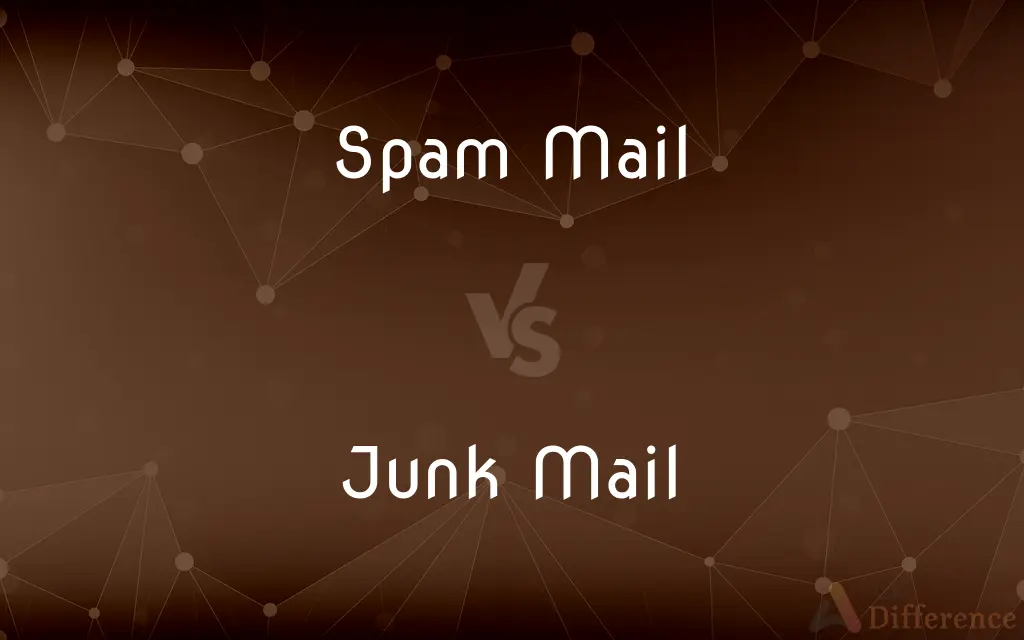Spam Mail vs. Junk Mail — What's the Difference?
Edited by Tayyaba Rehman — By Fiza Rafique — Published on November 12, 2023
Spam Mail is unsolicited digital messages sent in bulk, while Junk Mail refers to both unwanted digital emails and physical postal items.

Difference Between Spam Mail and Junk Mail
Table of Contents
ADVERTISEMENT
Key Differences
Spam Mail generally refers to unsolicited bulk messages sent over email, often with the purpose of advertising or phishing. Conversely, Junk Mail can encompass not only unwanted emails but also physical mail, typically consisting of advertising materials, that recipients have not agreed to receive.
Spam Mail is predominantly encountered in the digital realm and is often sent by entities using dubious or concealed identities. Junk Mail, while it can be digital, is often associated with physical postal systems and might be sent by legitimate businesses or organizations as part of broad advertising strategies.
In terms of regulations, Spam Mail is often subject to specific laws like the CAN-SPAM Act in the U.S., which outlines rules for commercial emails. Junk Mail, particularly physical ones, may not fall under such stringent rules, although recipients often have the option to opt-out.
The volume and frequency of Spam Mail are usually much higher due to the ease of sending mass emails at a low cost. Junk Mail, especially physical ones, involves printing and postage costs, which can limit the volume sent by businesses.
Spam Mail often requires specialized software for filtering due to its frequency and potential security risks. Junk Mail, on the other hand, can often be manually sorted and recycled, but digital junk mail also utilizes filtering technology.
ADVERTISEMENT
Comparison Chart
Medium
Primarily digital (emails).
Digital (emails) and physical (postal mail).
Purpose
Advertising, phishing, scamming.
Mostly advertising.
Frequency
High due to ease of sending.
Variable, less frequent for physical mail.
Sender Identity
Often dubious or hidden.
Can be known, legitimate businesses.
Cost Implications
Low operational costs.
Higher costs, especially for physical mail.
Compare with Definitions
Spam Mail
Electronic communications that inundate an email inbox, often commercial.
Her inbox was cluttered with Spam Mail promoting various products.
Junk Mail
Mass-distributed mail content, generally disregarded as irrelevant.
I spent the morning sorting through Junk Mail and bills.
Spam Mail
Unsolicited electronic messages sent in bulk.
I received a lot of Spam Mail offering dubious investment opportunities.
Junk Mail
Unwanted emails or physical mail, typically advertising products or services.
I’m always throwing away Junk Mail from my mailbox.
Spam Mail
Digital messages sent indiscriminately to numerous recipients.
He constantly received Spam Mail from unknown sources, so he installed a filter.
Junk Mail
Mail that is not pertinent to the recipient, usually promotional in nature.
Every time I open my email, it's full of Junk Mail and it's overwhelming.
Spam Mail
Emails sent en masse without the recipient's prior permission.
Companies that send Spam Mail risk legal penalties.
Junk Mail
Unsolicited materials sent via post or email, often ignored by recipients.
The new catalog from that furniture store is just more Junk Mail to me.
Spam Mail
Online messages, often repetitive and irrelevant, shared with multiple recipients.
Despite my careful online presence, I keep receiving Spam Mail.
Junk Mail
Physical or digital mail sent to large numbers of people, often unsolicited.
Even though I moved, I keep getting Junk Mail addressed to the previous resident.
Common Curiosities
Is all Junk Mail advertising?
Mostly, but Junk Mail can also include non-advertising content that the recipient considers irrelevant.
Can Spam Mail be dangerous?
Yes, Spam Mail can contain malicious links, attachments, or phishing attempts.
Can I stop physical Junk Mail?
Yes, you can often opt-out by contacting the sender or using postal service preferences.
How can I reduce the amount of Spam Mail I receive?
Use email filters, avoid disclosing your email unnecessarily, and unsubscribe from unwanted email lists.
How do businesses benefit from sending Junk Mail?
They reach potential customers with their advertising, albeit in an unsolicited manner.
Is sending Spam Mail legal?
Laws like CAN-SPAM in the U.S. regulate it, making certain unsolicited emails illegal.
Does Junk Mail have environmental implications?
Yes, especially physical Junk Mail, due to paper waste and transportation emissions.
Why do companies send Spam Mail?
It's a low-cost way to reach a massive audience, despite being unsolicited and often unwanted.
How do spammers collect addresses for Spam Mail?
Through methods like scraping websites, purchasing email lists, and using software tools.
What primarily differentiates Spam Mail from Junk Mail?
Spam Mail is exclusively digital and unsolicited, while Junk Mail can be both unsolicited digital messages and physical postal mail.
Are there laws against sending Junk Mail?
Laws specifically against Junk Mail are less common, though littering laws can apply to physical mail.
Is there any way to reuse or recycle physical Junk Mail?
Yes, most Junk Mail can be recycled, and some creative individuals even use it for art projects.
How can I differentiate valuable mail from Junk Mail?
By checking the sender's details, content relevance, and whether you recall subscribing or providing consent.
Can Spam Mail spread malware?
Yes, if it contains malicious attachments or links, it can infect systems with malware.
What should I do if I suspect Spam Mail is a scam?
Don't click any links, download files, or reply. Report it to relevant authorities.
Share Your Discovery

Previous Comparison
Pumpkin vs. Pumpkin Puree
Next Comparison
EliteBook vs. ProBookAuthor Spotlight
Written by
Fiza RafiqueFiza Rafique is a skilled content writer at AskDifference.com, where she meticulously refines and enhances written pieces. Drawing from her vast editorial expertise, Fiza ensures clarity, accuracy, and precision in every article. Passionate about language, she continually seeks to elevate the quality of content for readers worldwide.
Edited by
Tayyaba RehmanTayyaba Rehman is a distinguished writer, currently serving as a primary contributor to askdifference.com. As a researcher in semantics and etymology, Tayyaba's passion for the complexity of languages and their distinctions has found a perfect home on the platform. Tayyaba delves into the intricacies of language, distinguishing between commonly confused words and phrases, thereby providing clarity for readers worldwide.











































